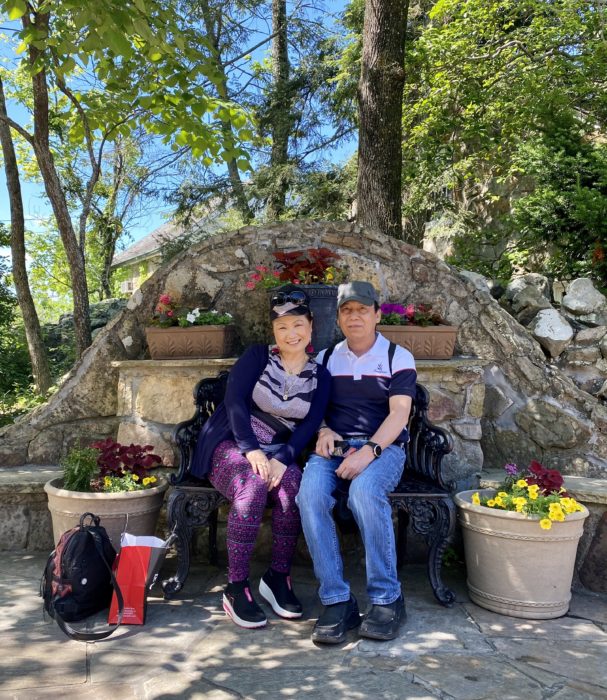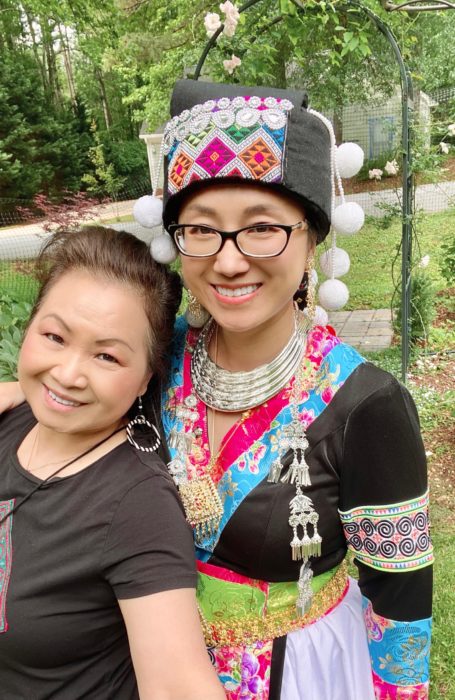May is National Asian American and Pacific Islander Heritage Month. This month, we shine a special spotlight on Dr. May Xiong, Associate Professor in Pharmaceutical and Biomedical Sciences, who shares the poignant story of her Hmong heritage.
Dr. May Xiong is part of an Asian ethnicity that has no homeland and has experienced persecution and failed attempts to assimilate into the culture of Asian countries where they have resided for centuries. Throughout these tribulations, the Hmong people have preserved their culture by promoting Hmong cuisine, wearing traditional clothing, and speaking their language from generation to generation. Dr. Xiong is immensely proud of her Hmong culture, and she is passionate about connecting with other Hmongs in Georgia so that she can keep her heritage alive.
According to Dr. Xiong, the history of the Hmong people is one of trials and conflict. Originating in the southern portion of China, Hmongs had separate rituals, languages, and customs from the Chinese culture. This subjected them to oppression and genocide by the Qing dynasty in the 18th and 19th centuries. To escape racist persecution and to protect their unique heritage, Hmongs migrated south into the northern mountains of Laos, where approximately 600,000 (2015) still live today. Dr. Xiong is quick to point out that Hmongs do not identify as Laotian, even though they reside as an ethnic minority in this area. For years, state-sponsored persecution and serious human rights violations against the Hmong by the government of Laos have been reported but has unfortunately received little international media scrutiny.
In the 1960s and 1970s, many Hmongs secretly were recruited by U.S. forces to fight against communism during the Vietnam War. After the U.S. pulled out of Vietnam, a communist regime took over in Laos and ordered the prosecution and re-education of all those who had fought against its cause. Hmongs fled Laos in fear and were evacuated by American civilian pilots over the Laotian border into refugee camps in Thailand.
“My grandfather, Lt. Col. Youa Kao Vang, bravely fought Vietnamese and Laotian communists under Gen. Vang Pao. When he passed away at the age of 98 in 2017 in Milwaukee, WI, the Milwaukee Journal Sentinel wrote a commemorative piece on him. I remember him pulling up his pant legs and showing us all the shrapnels still visible in his legs. He would jokingly recall that whenever he had to pass through airport security, he would invariably set off every metal detector thus announcing his arrival. But under this smile, he was in a lot of pain throughout his life.”
Later, many Hmong were welcomed to the U.S. and France as refugees due to their support of the American efforts during the war. According to the recent census, which likely is an underestimation, approximately 300,000 Hmong people live in the U.S., with the vast majority residing in tight-knit communities in California, Minnesota, and Wisconsin. There are about 5-6,000 who live in Georgia, including a small group in Monroe and Winder, both less than 30 miles from the UGA Arches. While aggregate data on Asian-American students suggests they are highly successful in the U.S., disaggregate data reveals drastic variations in academic and economic achievement between ethnicities.

Dr. Xiong’s parents
Dr. Xiong’s story began in a Thailand refugee camp, where she was born. She was only a month old when her parents immigrated to Strasbourg, France as refugees seeking a better life for their family.
“It was really scary for my parents to move to France. My dad spoke enough French to get by (Laos had been a colony of France therefore French was the official second language), but both of my parents suffered from PTSD and had only known an agrarian life. My father recalls those early days in France as being especially challenging because they had very little experience living in an industrialized European country. They were heartbroken to leave behind all the wealth my ancestors had accumulated over generations and found themselves left with nothing, having to rely on the charity of sponsors and religious organizations for food and lodging. He and my mother recall waking up in the middle of the night to loud popping sounds. Terrified that bombs were being dropped, my father remembers strapping me as a baby onto his back ready to jump out of an apartment window with my mother from the second floor of their apartment building. They calmed down after they realized that no bombs were being dropped. It was New Year’s Eve, and the neighborhood had set off firecrackers.
Dr. Xiong grew up speaking French yet spoke very little Hmong due to the limited number of Hmongs who lived in France. Dr. Xiong feels a strong affinity and considers France her adopted country of origin, having no memory of Laos or Thailand. When she was 10, Dr. Xiong’s family decided to join their relatives in the U.S., and they immigrated to California. At the time, Dr. Xiong still only spoke French and very little Hmong, so assimilating into an English-speaking school was doubly challenging, as teachers erroneously assumed other Hmong students could help translate for her. It was an intimidating and lonely experience for a young, shy girl who had to learn to adjust to two new cultures—American and Hmong—very rapidly. After three years in California, her family moved to Wisconsin to be closer to her maternal grandparents and due to increased manufacturing job opportunities and a lower cost of living. Dr. Xiong attended high school there.
“Growing up, I never quite fit in with one group,” said the PBS Professor, who joined UGA’s College of Pharmacy in 2016. “Throughout my childhood and teenage years, I forged my own path. I eventually made friends with people from many different ethnicities, but it was still difficult.”
Throughout her time living in the U.S., Dr. Xiong frequently has been associated with other Asian heritages, specifically Chinese. But because of language and cultural barriers, she often felt alienated from these tight Asian communities. And she didn’t always fit in with the American communities because of her minority heritage.
“My Hmong heritage sometimes clashed with American culture as well. For instance, in high school, I couldn’t date like American girls because of our traditional values. I didn’t have close friendships in high school either because I couldn’t participate in many after school activities since I was an inner-city kid bused into a more upscale suburban high school (Milwaukee had an enrollment option for students to attend public schools in other districts if seats were available.) Attending events, such as homecoming and prom, was out of the question since being unchaperoned with a young man was frowned upon. Hmong women were traditionally expected to focus on marrying young and raising a family – and their future spouse could be determined for them by their parents. When I was in high school, it wasn’t unusual to hear that a 15- or 16-year-old Hmong girl in my community had dropped out of high school to get married. That has slowly changed over the years, but it was definitely a fear my parents had for us; they really wanted us to go to college.”
So how did this aspiring scientist excel in her chosen profession? Despite all the obstacles, including parents who were unable to help she and younger two siblings with homework due to their own language barriers, Dr. Xiong graduated with honors from high school and went on to earn a B.S. in Biomedical Engineering from Marquette University in Milwaukee, Wisconsin and a Ph.D. in Pharmaceutical Sciences from the University of Wisconsin in Madison. Dr. Xiong’s path to a career in industry or academia was ultimately decided when she was awarded a F32 Kirschstein postdoctoral fellowship for additional training at the California Institute of Technology. And she did this all while completing her dissertation studies.
“I was the only Hmong student in many advanced engineering and science courses as an undergraduate and graduate student, and I was the first Hmong person to receive a Ph.D. in Pharmaceutical Sciences from the School of Pharmacy at the University of Wisconsin-Madison. I never had anyone with my particular background and ethnicity to look up to – a role model who was both Hmong and a scientist with whom I could closely identify and emulate. To this day, I have never met anyone like myself in academia.”
She credits programs such as the Educational Opportunity Program (EOP) at Marquette University for financial access to college and for successfully helping her navigate through the trials of college life while living at home with her parents. The EOP aids through mentorship, academic programs, financial assistance, counseling/advising, and other campus support services to those who are first-generation college students, and/or from low-income and educationally disadvantaged backgrounds.
As a PBS Associate Professor, her research program is in the area of drug delivery. Currently, she studies how the design of new materials and macromolecules can improve drug delivery for chelation therapy and she is also tackling multi-drug resistance in bacteria with these materials. Her interests are broad (ranging from cancer to neurodegenerative disorders to genetic blood disorders to antimicrobials) due to the ubiquitous application of drug delivery to any therapeutic. To learn more about her area of expertise, see her research website entry at www.xionglab.uga.edu.
“It’s not often you find Hmong women in fields related to science,” she remarked. “My journey has been lonely at times and full of trials and errors, but I have had great mentors along the way. These mentors were fantastic, because they cared about my success and me as a person. You often don’t know what you don’t know, and that’s where a good mentor comes in.”

Dr. Xiong (right) and her mother
While the Hmong culture has always been very traditional, some things are slowly changing. Dr. Xiong’s parents have been more opened-minded than some other members of the Hmong community, especially in education and science careers for women. While her parents couldn’t provide her with career guidance, she said, “I attribute much of my success to the love and sacrifice they made, along with support systems such as the EOP and caring mentors for providing me with the keys to success. I want to be a role model for other Hmong students who are considering a scientific career, and I want to be a source of inspiration for others who also come from similar humble beginnings. I’m hoping that sharing my story and my experiences will encourage others to venture out and pursue their passions and to find mentors with whom they can relate. A great mentor doesn’t necessarily have to be someone in your career arena as long as they understand the bigger picture of where you are trying to go in life. I think having a mentor with whom you can relate is so critical for those times when you fail. When you already feel you don’t quite fit in and have no one to turn to, a mentor can offer inspiration and emotional support,” Dr. Xiong remarked.
She concluded that there is a fear that as older members of her generation pass on, the knowledge of her heritage will die as well. “Although there is a small Hmong community in GA, I am told that most families here are farmers and live far apart. There are no Hmong markets or restaurants, so I really miss access to tasty Hmong dishes the most! I am eager to meet with other Hmong people who are a part of the UGA community and beyond. I invite anyone who is interested to reach out to me so that we can share our heritage. My email is: mpxiong@uga.edu.”


